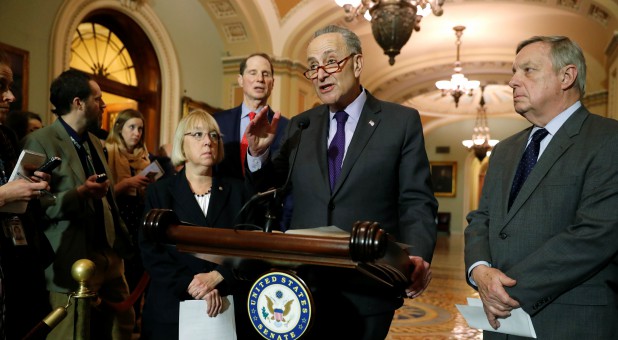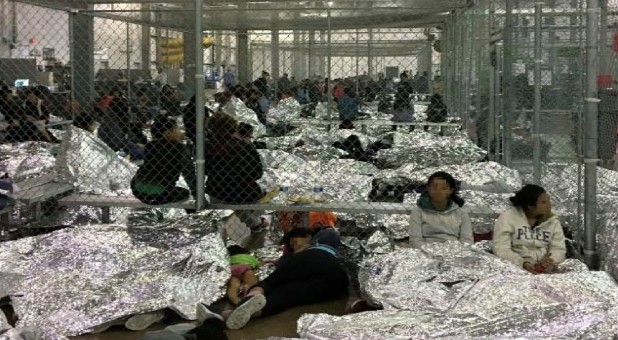Democratic Senate leader Chuck Schumer met with President Donald Trump at the White House on Friday to search for ways to avert a U.S. government shutdown, but Schumer said afterward that disagreements remained as the clock ticked toward a midnight deadline to pass a funding bill.
Trump invited Schumer to the White House as a stopgap bill to fund the federal government through Feb. 16 appeared on the verge of collapse in the Senate, where Democratic votes are needed to pass it.
“We had a long and detailed meeting,” Schumer told reporters on his return to the U.S. Capitol after the approximately 90-minute meeting. The chiefs of staff for each man—John Kelly for Trump and Mike Lynch for Schumer—also attended.
“We discussed all of the major outstanding issues. We made some progress, but we still have a good number of disagreements. The discussions will continue,” Schumer said.
The Republican-controlled House of Representatives approved the stopgap spending measure late on Thursday, but it has been sidetracked in the Senate by a dispute over immigration. The House had planned to recess later on Friday for a weeklong break but members were warned they could be called back for votes.
White House budget director Mick Mulvaney said on Thursday he was ratcheting up the likelihood of a government shutdown from 30 percent to a 50-50 possibility.
The showdown follows months of struggle in Congress to agree on government funding levels and the immigration issue. The federal government is operating on a third temporary funding measure since the new fiscal year began in October.
Democrats have demanded the bill include protections from deportation for 700,000 young undocumented immigrants. Those children, known as “Dreamers,” were brought into the United States as children, largely from Mexico and Central America, and given temporary legal status under a program started by former President Barack Obama. Many have been educated in the United States and know no other country.
In September, Trump announced he was ending the program and giving Congress until March 5 to come up with a legislative replacement.
Leaders of both parties blamed each other for the impasse.
“Now that we’re 13 hours away from a government shutdown that Democrats would initiate and Democrats would own, the craziness of this seems to be dawning on my friend the Democratic leader,” Senate Republican leader Mitch McConnell said, referring to Schumer.
‘Don’t Turn Your Back’
Dick Durbin, the No. 2 Democrat in the Senate, said Republicans needed to sit down and negotiate and called on House Republicans not to leave town until the crisis was averted.
“I would beg them, don’t turn your back on your responsibility right here in Washington to work with us, to try to find a way forward,” Durbin said.
Trump, on the eve of the first anniversary of his inauguration, said in a morning tweet that Democrats were holding up a resolution over the immigration issue.
“Democrats are needed if it is to pass in the Senate – but they want illegal immigration and weak borders. Shutdown coming?” he said.
Democratic Senator Tim Kaine told reporters that lawmakers were close to a longer-term deal and should not pass another 30-day funding measure.
“We can get there, we’re close enough we can get there if we just stay on it,” he said. “I think we can get one in the next few days.”
Republican Senator Tom Cotton said he was willing to provide protection to DACA recipients in future negotiations.
“We have another six weeks to solve that problem. It doesn’t really involve government funding,” he told Fox News Channel. “We should take those two issues up in sequence.”
Republicans have a 51-49 majority in the Senate, but with Senator John McCain undergoing cancer treatment at home in Arizona they need at least 10 Democrats to reach the 60 votes required to pass a spending bill. In addition to strong Democratic opposition, at least three Republican senators have said they will not back the resolution in its current form.
Republican Senator Mike Rounds, who had earlier said he could not back the bill, on Friday said in a statement that while the measure was “not ideal,” he would support it after being assured that other legislation to adequately fund the U.S. military would be raised soon.
Democratic Senator Joe Manchin of West Virginia has indicated he was leaning in favor of the stopgap measure. Manchin is one of 10 Democrats up for re-election this year in states Trump won in the 2016 presidential election.
When the government shuts down, which has only happened three times in a meaningful way since 1995, hundreds of thousands of “non-essential” federal workers may be put on furlough, while “essential” employees, dealing with public safety and national security, would keep working.
Amid the deadlock, more senators were raising the possibility of merely approving enough new federal funds for a few days. The idea is to put pressure on negotiators to then cut deals on immigration, defense spending and non-defense funding by next week.
But McConnell shot down that plan on Friday. “Let’s fund the government for a full month so we can actually get something done” and negotiate other issues including immigration, he said.
In shutdowns, nonessential government employees are often furloughed, or placed on temporary unpaid leave. Workers deemed essential, including those dealing with public safety and national security, keep working, some with pay and others without.
After previous government shutdowns, Congress passed measures to ensure that essential and nonessential employees received retroactive pay.
The last shutdown, in October 2013, lasted more than two weeks and more than 800,000 federal employees were furloughed. Here is what happened then, along with some recent updates from officials:
MILITARY: The Defense Department said on Friday that a shutdown would not affect the U.S. military’s war in Afghanistan or its operations against Islamist militants in Iraq and Syria. All military personnel on active duty would remain on normal duty status. Civilian personnel in nonessential operations would be furloughed. Defense Secretary Jim Mattis said a sustained funding impasse would cause ships to go without maintenance and aircraft to be grounded.
JUSTICE: The Justice Department has many essential workers. Under its shutdown contingency plan, about 95,000 of the department’s almost 115,000 staff would keep working.
FINANCIAL OVERSIGHT: The stock market-policing Securities and Exchange Commission funds itself by collecting fees from the financial industry, but its budget is set by Congress. It has said in the past it would be able to continue operations temporarily in a shutdown. But it would have to furlough workers if Congress went weeks before approving new funding.
The Commodity Futures Trading Commission, meanwhile, would have to furlough 95 percent of its employees immediately. An agency spokeswoman said the derivatives regulator could, however, call in additional staff in the event of a financial market emergency.
NATIONAL PARKS: National parks closed in 2013 and it resulted in a loss of 750,000 daily visitors, said the nonprofit National Parks Conservation Association. The National Park Service (NPS) estimated the shutdown resulted in $500 million in lost visitor spending in areas around the parks and the Smithsonian museums. The Trump administration has asked the NPS to examine ways to keep portions of some parks open, but overnight visitors might have to pack out their own trash, the Washington Post reported.
WASHINGTON TOURIST SIGHTS: In 2013, popular tourist sites such as the Smithsonian closed, with barricades going up at the Lincoln Memorial, the Library of Congress and the National Archives. The National Zoo closed and its popular “Panda Cam” went dark. The Smithsonian has said its museums could remain open for the first weekend. The NPS, which oversees many Washington landmarks, including the National Mall, has said it has a plan in place so that “First Amendment activities” can continue during a shutdown.
TAXES: The Internal Revenue Service furloughed 90 percent of its staff in 2013, the liberal Center for American Progress said. About $4 billion in tax refunds were delayed as a result, according to the Office of Management and Budget (OMB).
MAIL DELIVERY: Deliveries would continue as usual because the U.S. Postal Service receives no tax dollars for day-to-day operations.
TRAVEL: Air and rail travelers did not feel a big impact in 2013 because security officers and air traffic controllers remained at work. Passport processing continued with some delays.
COURTS: The Administrative Office of the U.S. Courts has said federal courts, including the Supreme Court, could continue to operate normally for about three weeks without additional funding.
HEALTH CARE: Sign-ups for the newly created Obamacare health insurance exchanges began as scheduled in 2013. The Medicare health insurance program for the elderly continued largely without disruption. A program at the U.S. Centers for Disease Control and Prevention to track flu outbreaks was temporarily halted. Hundreds of patients could not enroll in National Institutes of Health clinical trials, according to the OMB.
CHILDREN: Six Head Start programs in Alabama, Connecticut, Florida, Georgia, Mississippi and South Carolina serving about 6,300 children shut for nine days, the OMB said.
SOCIAL SECURITY: Social Security and disability checks were issued in 2013 with no change in payment dates and field offices remained open but offered limited services. There were delays in the review process for new applicants.
LOANS: Processing of mortgages and other loans was delayed when lenders could not access government services such as income and Social Security number verification. The Small Business Administration was unable to process about 700 applications for $140 million in loans until the shutdown ended, OMB said.
VETERANS: Most employees at the Department of Veterans Affairs would not be subject to furlough. VA hospitals would remain open and veterans’ benefits would continue, but education assistance and case appeals would be delayed, the department said.
FOOD INSPECTIONS: Department of Agriculture meat inspectors stayed on the job. Agricultural statistical reports ceased publication. The USDA’s website went dark.
ENERGY: The Department of Energy said on Friday that since most of its appropriations are for multiple years, employees should report to work as normal during a shutdown until told otherwise. If there was a prolonged lapse in funding a “limited number” of workers may be placed on furlough.
{eoa}
© 2018 Thomson Reuters. All rights reserved.
See an error in this article?
To contact us or to submit an article






















